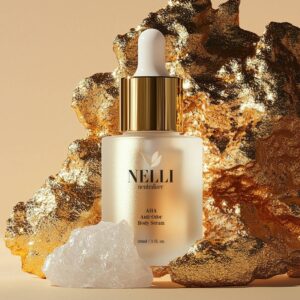
If you’ve suddenly noticed a change in how your body smells—especially during midlife—you’re not alone. Perimenopause body odor is a real (and surprisingly common) experience for many women entering the transitional phase before menopause.
As hormone levels shift, your body goes through a cascade of changes, and one unexpected effect can be a stronger or different natural scent. While it can feel awkward or even distressing, understanding the root causes behind these changes can help you feel more in control—and more confident.
Let’s explore what causes perimenopause body odor, why it happens, and what you can do about it.
Table of Contents
Understanding Perimenopause Body Odor: Causes and Management
As women approach their 40s, many notice a shift in their body’s natural scent. This change, often attributed to perimenopause, is primarily due to fluctuating hormone levels. Decreased estrogen disrupts the body’s overall hormone balance, leading to increased sweating and changes in the skin’s microbiome.

Hot flashes and night sweats, common during this phase, further contribute to excessive sweating, providing a breeding ground for odor-causing bacteria.
This transitional phase can last up to a decade, and yes, perimenopause body odor is part of the experience for many.
This isn’t the “youthful sweat” of spin class. It’s a deeper, more acidic, sometimes sour aroma triggered by hormonal shifts, stress, and changes in your microbiome.
What Is Perimenopause?
Perimenopause refers to the transitional phase leading up to menopause, characterized by fluctuations in hormone levels, particularly estrogen and progesterone. This phase typically begins in a woman’s 40s but can start earlier or later. Symptoms can last for several years and vary widely among individuals.
What Causes Perimenopause Body Odor?
Perimenopause body odor is primarily caused by fluctuating hormone levels—especially the drop in estrogen—which can disrupt your body’s natural temperature regulation and increase sweat production. At the same time, a relative rise in testosterone may make sweat smell stronger when it mixes with bacteria on the skin. Add in common perimenopausal symptoms like hot flashes, night sweats, and heightened stress, and it’s no wonder body odor can suddenly change during this phase of life.
Several factors contribute to changes in body odor during perimenopause:
1. Hormonal Fluctuations
Decreased estrogen levels can lead to an increased ratio of testosterone, influencing sweat production and composition. This hormonal imbalance can result in more pronounced perimenopause body odor.
2. Increased Sweating
Hot flashes and night sweats are common perimenopausal symptoms that lead to increased perspiration. Sweat itself is odorless, but when it interacts with skin bacteria, it can produce a noticeable smell.
3. Changes in Sweat Gland Activity
The body has two primary types of sweat glands: eccrine and apocrine. Apocrine glands, located in areas like the armpits and groin, produce a thicker sweat that, when broken down by bacteria, leads to perimenopause body odor.
4. Altered Sense of Smell
Hormonal changes can also affect olfactory perception, making women more sensitive to odors, including their own body scent.
Other Contributing Factors
Beyond hormonal changes, other elements can influence body odor during perimenopause:
- Diet: Consuming certain foods like garlic, onions, and spicy dishes can affect body odor.
- Medications: Some drugs, including antidepressants, can increase sweating.
- Stress and Anxiety: Emotional stress can activate apocrine glands, leading to stronger-smelling sweat.
- Medical Conditions: Conditions like diabetes or infections can alter body odor.
Managing Perimenopause Body Odor
While changes in body odor are natural during perimenopause, several strategies can help manage them:
1. Maintain Good Hygiene
Sweat alone doesn’t cause body odor; it’s the bacteria on your skin that interacts with sweat, leading to unpleasant smells. To minimize perimenopause body odor, consider switching to antibacterial soap during your showers to help reduce bacteria buildup. Showering more frequently can also make a difference. Some people even opt for two showers a day or carry antibacterial wipes with them for quick refreshment throughout the day. Some women find that showering twice daily is beneficial.
The Nelli Neutralizer Anti-Odor Shower Foam is a game-changer for combating perimenopause body odor. Formulated with a powerful blend of glycolic, lactic, mandelic, and salicylic acids, it doesn’t just cleanse—it actively neutralizes odor, helping to restore freshness and balance during this hormonal transition.
2. Wear Breathable Clothing
Managing perimenopause body odor caused by hot flashes can significantly improve your comfort. The key to staying cool throughout the day is layering your clothing, so you can easily remove items when you start to feel warm. Choose natural, breathable fabrics like cotton, silk, or wool, and avoid synthetic materials such as polyester or polyamide, which can trap heat and increase sweating. Additionally, investing in sweat-wicking sportswear can help draw moisture away from your skin, keeping your body temperature regulated and your skin dry.
3. Keep Your Sleeping Area Cool
If perimenopause body odor and night sweats are disrupting your sleep, creating a cooler sleep environment can make a big difference. Try setting your thermostat a bit lower than usual, or opt for lightweight, breathable bedding and nightwear to help regulate your body temperature. Using fans, cooling sprays, or cooling pillows can also provide relief. Additionally, cutting out alcohol, caffeine, and spicy foods in the evening can help prevent these symptoms from worsening.
4. Stay Hydrated
Drinking plenty of water is essential for managing perimenopause body odor. Staying well-hydrated helps dilute sweat and flush out toxins, which can reduce the intensity of body odor. Proper hydration also supports overall skin health, keeping you feeling fresh and balanced throughout the day.
5. Monitor Your Diet
Certain vegetables can cause gas, and foods like garlic, onions, and alcohol can affect how your sweat smells. Take note of how your diet and daily activities influence your body odor. If you notice a pattern, consider cutting back on those foods to see if it makes a difference. Keeping a food diary can be a helpful tool in identifying which foods might be contributing to body odor, allowing you to make informed dietary adjustments.
6. Manage Stress
Effectively managing stress is key to reducing stress-induced sweating, a common contributor to perimenopause body odor. Incorporating stress-reduction techniques such as meditation, yoga, or deep breathing exercises can help calm your mind, balance your hormones, and prevent excessive perspiration. By lowering your stress levels, you can better regulate your body’s response to emotional triggers, ultimately minimizing the impact of sweat on your scent and overall well-being.
7. Find the Right Deodorant
If your regular deodorant isn’t keeping up with your needs, it might be time to switch. For those seeking a more effective solution, Nelli Neutralizer Anti-Odor Serum offers a powerful, clinical-grade formula that neutralizes odor and keeps you feeling fresh longer. It’s designed to tackle perimenopause body odor and the hormonal changes that come with it.
8. Avoid Douching
If you’re noticing a change in scent down there, it might be tempting to use soaps and fragrances, but this can worsen perimenopause body odor. Douching and using special washes or sprays can disrupt the natural balance of good bacteria in the vaginal area, which can lead to more serious issues like recurrent infections and stronger odors. To keep your vulva and vagina clean, simply use regular soap (externally) or just water, and avoid products that may disturb your body’s natural pH and healthy bacteria.
9. Take Probiotics
Adding a probiotic to your daily routine can help maintain a healthy balance of bacteria in both your gut and on your skin, which may assist in managing perimenopause body odor. Probiotics support the growth of beneficial bacteria, which can prevent the overgrowth of odor-causing bacteria. Certain strains of probiotics are particularly helpful in balancing hormone levels and improving skin health during perimenopause.
Look for probiotics containing strains like Lactobacillus acidophilus, Bifidobacterium bifidum, and Lactobacillus reuteri, as these can help restore the natural microbiome and reduce inflammation that may contribute to body odor. Lactobacillus rhamnosus has also been shown to have antimicrobial properties that can help fight bacteria causing unpleasant smells.
Probiotic-rich foods like yogurt, kefir, sauerkraut, kimchi, and miso are also excellent natural sources to help nourish your body’s beneficial bacteria. By introducing these probiotics, you can support better gut health, reduce the internal imbalances that contribute to body odor, and promote a healthier, fresher scent throughout perimenopause.
10. Consult Healthcare Providers
If perimenopause body odor becomes particularly bothersome, discussing symptoms with a healthcare provider can be beneficial. They may suggest treatments like hormone therapy to address underlying hormonal imbalances.
The Science-Backed, Aluminium-Free Serum That’s Changing Everything
Enter: Nelli Neutralizer Anti-Odor Serum—a truly revolutionary formula engineered for women navigating the highs and lows of perimenopause body odor. This isn’t just another trendy deodorant. It’s a clinical-grade odor neutralizer powered by five exfoliating acids, calming botanicals, and intelligent delivery agents that penetrate deeper and perform longer.
This miracle serum is guaranteed to last all day, even through hot, humid climates, workouts, or extreme stress. Suitable for hyperhidrosis, it’s the longest-lasting deodorant I—and many others—have ever used. Period.
Synergistic Acid Complex: Eliminate Perimenopause Body Odor
- Glycolic Acid – Gently exfoliates dead skin cells and reduces odor-causing bacteria.
- Lactic Acid – Balances skin pH and hydrates while targeting microbial overgrowth.
- Mandelic Acid – Oil-soluble yet gentle, antimicrobial – ideal for sensitive underarms prone to perimenopause-related changes.
- Salicylic Acid – Penetrates sebum-rich sweat glands to unclog and purify.
- Gluconolactone – A polyhydroxy acid that offers both exfoliation and antioxidant benefits.
Unlike traditional deodorants, this acid blend resets your underarm microbiome, discouraging the overgrowth of bacteria that metabolize sweat into odor. And because they’re balanced at the optimal pH, they support rather than disrupt skin integrity.
The Soothing Hydration Layer: Because Your Skin Deserves It
The Nelli Neutralizer isn’t just powerful—it’s also luxuriously gentle, thanks to ingredients like:
- Aloe Barbadensis Leaf Water – Renowned for soothing inflammation.
- Sodium Hyaluronate – A low molecular weight hyaluronic acid that hydrates deeply.
- Tea Tree Leaf Water – Antimicrobial and balancing.
- Dipotassium Glycyrrhizate – Derived from licorice root, calms sensitivity and redness.

This isn’t your average chalky, sticky mess. It’s a watery serum texture that absorbs instantly and leaves no residue—just clean, breathable skin.
How Intelligent Delivery Agents Maximise Effectiveness
Now, here’s where the formula truly earns its crown. Advanced carriers ensure that each active ingredient penetrates the skin’s barrier efficiently and stays potent throughout the day. This means that even in scorching heat, intense workouts, or stressful meetings, your underarms are actively working for you, not against you.
Final Thoughts: Why This Is More Than Just a Deodorant
If you’ve tried everything to combat perimenopause body odor—creams, sprays, sticks, even crystal rocks (yes, really), —it’s time to experience the difference with Nelli Neutralizer Anti-Odor Serum. It truly stands out as a powerful solution that goes beyond the ordinary.
This isn’t just personal care—it’s confidence, comfort, and empowerment in a bottle.






